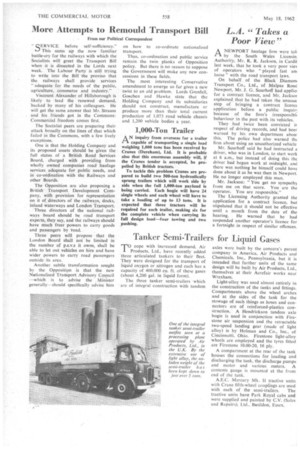More Attempts to Remould Transport Bill L.A. " Takes a From our Political Correspondent Poor View"
Page 34

If you've noticed an error in this article please click here to report it so we can fix it.
SERVICE before self-sufficiency." This sums up the now familiar battle-cry for the railways with which the Socialists will greet the Transport Bill when it is dissected in the Lords next week. The Labour Party is still trying to write into the Bill the proviso that the railways shall provide services "adequate for the needs of the public, agriculture, commerce and industry."
Viscount Alexander of Hillsborough is likely to lead the renewed demand, backed by many of his colleagues. He will get the same answer that Mr. Strauss and his friends got in the Commons: Commercial freedom comes first.
The Socialist peers are preparing their attack broadly on the lines of that which failed in the Commons, with a few lively exceptions.
One is that the Holding Company and its proposed assets should be given the full status of a British Road Services Board, charged with providing from wholly owned companies road haulage services adequate for public needs, and in co-ordination with the Railways and other Boards.
The Opposition are also proposing a British Transport Development Company, with provision for representation on it of directors of the railways, docks, inland waterways and London Transport.
Three directors of the national railways board should be road transport experts, they say, and the railways should have much freer powers to carry goods and passengers by road.
Three peers will propose that the London Board shall not be limited in the number of p.s.v.s it owns, shall be able to let out vehicles on hire and have wider powers to carry road passengers outside • its area.
Another subtle transformation sought by the Opposition is that the new Nationalised Transport Advisory Council —which is to advise the , Minister generally-should specifically advise him on how to co-ordinate nationalized transport.
Thus, co-ordination and public service remain the twin planks of Opposition policy. But there is no reason to suppose the Government will make any new concessions in these fields.
The most interesting Conservative amendment to emerge so far gives a new twist to an old problem. Lords Grenfell, Goschen and Hawke state that the Holding Company and its subsidiaries should not construct, manufacture or produce more than their total current production of 1,073 road vehicle chassis and 1,200 vehicle bodies a year.
1,000-Ton Trailer
AN inquiry from overseas for a trailer capable of transporting a single load weighing 1,000 tons has been received by Cranes (Dereham), Ltd. It is probable also that this enormous assembly will, if the Cranes tender is accepted, be propelled by British tractors.
To tackle this problem Cranes are prepared to build two 500-ton hydraulically sprung trailers which will work side by side when the full 1,000-ton payload is being carried. each bogie will have 24 single wheels and each wheel will have to take a loading of up to 13 tons. It is expected that three tractors will be required for each trailer, making six for the complete vehicle when carrying its full design load—four towing and two pushing.
A NEWPORT haulage firm were tot
by the South Wales Licensin Authority, Mr. R. R. Jackson, in Cardit last week, that he took a very poor vie+, of operators who "played fast am loose" with the road transport laws.
On behalf of the Black Diamoni Transport Co., Ltd., of Malpas RoaC Newport, Mr. J. G. Suurhoff had applies for a contract licence, and Mr. Jacksol explained that he had taken the unusua step of bringing a contract licence application before a public inquir: because of the firm's irresponsibli behaviour in the past with its vehicles.
They had twice been convicted ir respect of driving records, and had beer warned by his own department abou this. The police had also warned tht firm about using an unauthorized vehicle Mr. Suurhoff said he had instructed a driver, who was in London, to start work at 6 a.m., but instead of doing this the driver had begun work at midnight. and there was nothing he himself could have done about it as he was then in Newport. He no longer employed this man.
Mr. Jackson: "You get no sympathy from me on that score. You are the operator. You are responsible."
The Licensing Authority granted the application for a contract licence, but stipulated that it should not be effective until a month from the date of the hearing. He warned that he had suspended another operator's licence for a fortnight in respect of similar offences.




















































































































